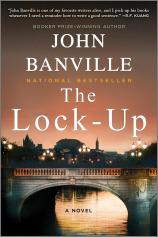The Lock-Up
Review
The Lock-Up
After seven mysteries written under the pen name Benjamin Black, Booker Prize-winning Irish novelist John Banville (THE SEA) decided to step out from behind the curtain and reclaim his literary identity with his 2020 novel, SNOW. Evidently, Black’s vacation has turned into a well-earned retirement. THE LOCK-UP is Banville’s third mystery produced under his own name, and it’s a treat for anyone who has enjoyed his smart police procedurals regardless of their authorial attribution.
The main action of the novel takes place in Dublin in 1957 and features two recurring characters, pathologist Garret Quirke and Detective Inspector St. John Strafford, together for the third time. They’re conjoined by a tragedy --- the murder of Quirke’s second wife in Spain, and Strafford’s role in offing her killer --- and sharing an aura of melancholy that forms between them, “an unwilled and unwelcome flesh-warm, awful intimacy.” Six months after his wife’s death, Quirke understandably remains mired in a grief that he attempts to submerge in copious drinking. Strafford, Irish-born but of an English ancestry that he still wears uncomfortably, now lives alone after his wife abruptly leaves him without explanation.
"THE LOCK-UP is Banville’s third mystery produced under his own name, and it’s a treat for anyone who has enjoyed his smart police procedurals regardless of their authorial attribution."
Strafford has been charged with investigating the death of Rosa Jacobs, a 27-year-old Jewish graduate student in history at Trinity College and pro-abortion protestor (only one of her several efforts at political activism) from Cork. Her body has been found in her car in a Dublin lock-up garage, the victim of an apparent suicide by carbon monoxide poisoning. But after Quirke gratuitously performs a postmortem, the results point strongly toward murder.
That finding launches the two on a probe that will have them exploring the shadowy past and current activities of a wealthy German émigré to Ireland and his son. It stretches all the way to another suspicious death in Israel and the efforts of the young, endangered state to develop its own atomic bomb. Along the way, Banville rounds out the portraits of his protagonists by involving them in some awkward romantic entanglements.
After Strafford and Quirke have cracked the case, Banville saves a final plot twist for a chilling epilogue. It’s one that almost certainly will divide readers into strongly opinionated camps. However, in both its theme and literary quality, it fits comfortably with the rest of the story.
Banville follows the detective and the doctor as they work to unravel the mystery of Rosa’s death. But he’s also unafraid to touch on sensitive subjects, like the almost unquestioned power of the Catholic Church in 1950s Ireland, and the presence of a casual anti-Semitism in that institution, along with persistent class distinctions in Irish society. “Everyone knows everyone else’s business” in Banville’s Dublin, portrayed here with palpable realism in an early autumn that features chill winds and rain that at times “fell straight down through the still air with vengeful concentration.”
In an interview after he had written several of his Benjamin Black novels, Banville confessed that he turned to the pseudonym to relieve some of the pressure to produce the exquisite writing that’s a hallmark of his literary fiction. “On a good day Banville can't write more than 400 words,” he observed, “but they are all in more or less the right order. With Black it's 10 times more.” As reflected here, Banville strikes a comfortable balance between the demands of mystery plotting and polished prose. He’s as interested in his investigators’ emotional burdens as he is in the clues they’re unearthing. There are even allusions to Shakespeare, Yeats and Proust, and a scrap of a poem by the 16th-century English poet Thomas Wyatt comes to Quirke’s mind in a romantic moment.
Whether they’ve come to Banville’s mystery novels through his alter ego or Banville himself, his fans will relish this latest entry in his body of work. And as for others for whom THE LOCK-UP is a point of entry to his excursion into this genre, they have lots of entertaining reading awaiting them.
Reviewed by Harvey Freedenberg on May 26, 2023
The Lock-Up
- Publication Date: September 3, 2024
- Genres: Fiction, Historical Fiction, Historical Mystery, Mystery
- Paperback: 320 pages
- Publisher: Hanover Square Press
- ISBN-10: 1335009183
- ISBN-13: 9781335009180



